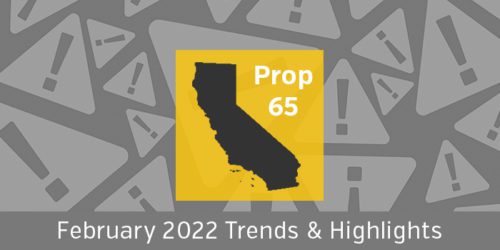Proposition 65 Notices of the Month – February 2022: Cassava Flour and Chips, Hot Cocoa, Ceramics and Glassware, Boots and Shoes, and Bicycle Helmets
March 2022
Proposition 65: Trends and Highlights in February 2022
In February 2022, the number of new Proposition (“Prop. 65”) Notices of Violation (“Notices”) that citizen plaintiff groups issued was approximately two hundred (200) in total. Food and nutritional supplement claims were abundant, as were claims related to alleged lead and bisphenol A (“BPA”) in various consumer products. A handful of claims also alleged titanium dioxide and asbestos in cosmetics products required Prop. 65 warning labels. This alert discusses these claims and other trends in Prop. 65 Notices for the month of February.
Prop. 65, the Safe Drinking Water and Toxic Enforcement Act of 1986, requires “clear and reasonable warnings” on products sold in California if use of the products causes exposure to chemicals on the Prop. 65 List. Prop. 65 also gives interested citizen plaintiffs a private right of action to enforce these claims and recover their attorneys’ fees if they are successful. Common chemicals in Notices that are typically targeted include lead, acrylamide, cadmium, arsenic, mercury, and phthalates (Di(2-ethylhexyl)), phthalate (“DEHP”), diisononyl phthalate (“DINP”), and Di-n-butyl phthalate (“DBP”).
In the February Notices, as is the case every month, citizen plaintiff groups alleged that various chemicals in food, consumer products, and personal care products required Prop. 65 warning labels because the products’ use or consumption exposes California consumers to chemicals in quantities that could cause cancer or reproductive harm.
60-Day Notices for Food
In February, the majority of Notices sent by plaintiff citizen enforcers related to allegations that alleged metals in dietary supplements and different types of foods required Prop. 65 warning labels.
- Acrylamide in Crispy and Roasted Foods.[1] Plaintiff citizen enforcers sent eleven (11) new and amended Notices for products such as cookies, crackers, corn sticks, chips, potato chips, breadsticks, and stuffing mix, alleging that acrylamide in the products required a Prop. 65 warning label.
- Metals in Fruits & Vegetables. Over twenty (20) Notices were sent in February alleging that different types of fresh, dried and canned vegetables required a Prop. 65 warning label. Noticed products included: cassava chips and flour, mushrooms, capers, vegetable puffs, tomato paste, sliced pears, vegetable chips, date paste, chili pickles, stir fry vegetables, mushrooms, and seaweed. Seaweed has been a favorite target of citizen plaintiff enforcers for a number of years.
- Metals in Dietary Supplements. Dietary supplements remained another common target for February 2022. Thirteen (13) Notices alleged that heavy metals including lead and cadmium in various dietary supplements required a Prop. 65 warning label.
- Metals in Spices. Spices continue to be a favorite focus of citizen plaintiff groups. In February, ten (10) new Notices were sent alleging that spices including cocoa powder, ground flax seed, and ginger slices contained levels of metals that required a Prop. 65 warning label.
60-Day Notices for Consumer Products
Consumer product Notices in February 2022 once again related to alleged phthalates (DEHP, DINP and DBP) in largely pliable plastic products and alleged lead in ceramics and hardware. Notices regarding alleged BPA were also prevalent.
- Phthalates (DEHP, DINP and DBP) in Plastic Products and Components. Close to 100 Notices were issued by citizen plaintiff groups in February for claims related to alleged phthalates in pliable plastic products, including re-issued and amended Notices. Products noticed included: journals, toiletry bags, hunting accessories, tools with vinyl/PVC grips, and slippers.
- Lead in Ceramics and Glassware. More than ten (10) Notices alleged that lead in consumer products, including mugs, glassware, and other ceramic products required a Prop. 65 warning label.
- BPA in Bicycle Helmets, Visors, Boxes and Shoes. Nine (9) Notices in February also alleged that various consumer products, including wildlife/hunting calls, phone cases, and face shields contained BPA and therefore required a Prop. 65 warning label.
60-Day Notices for Personal Care Products
In February, there were also a number of Notices for personal care products, including the following:
- Titanium Dioxide in Cosmetic Products. Six (6) Notices alleged that titanium dioxide in certain loose powder cosmetic products warranted a Prop 65 warning label.
- Beta-Myrcene, delta-9-tetrahydrocannabinol in Lip Balm. Two (2) Notices were sent for CBD/hemp based lip balm, alleging that beta-Myrcene, delta-9-tetrahydrocannabinol in the lip balm required a Prop. 65 warning label.
What Should Food, Consumer Product, Personal Care, and Manufacturing Businesses Do Next?
Prop. 65 trends change each month according to the state of the law, interests of citizen plaintiff groups, as well as the concentrations of chemicals in easily accessible products. Companies doing significant business in California should monitor Prop. 65 notices and trends and use the Prop. 65 warning language on California products when required.
Prop. 65 is a substantial risk issue for companies selling products in California. Compliance and labeling is costly, as is a Prop. 65 dispute, which can subject a potential defendant to attorneys’ fees in both defending the claim and the plaintiff’s attorneys’ fees as well.
Complying with Prop. 65 includes testing products for common Prop. 65 chemicals and understanding potential exposure of the public to the chemical at issue. Implementing contractual indemnity language in the supply chain helps to ensure that products sold in California (either online or in brick-and-mortar stores) are adequately screened by upstream manufacturers, suppliers, and producers for Prop. 65 compliance. Prop. 65 liability most frequently rests with those up the supply chain. For those businesses, monitoring Prop. 65 trends and common claims is a key part of a successful compliance program.
[1] The issue of the acrylamide cancer warning label is presently being litigated in the Eastern District of California and Ninth Circuit Court of Appeals, in Cal. Chamber of Commerce v. Becerra, Case No. 2:19-cv-02019. The California Attorney General’s website discusses the Prop. 65 acrylamide litigation and Ninth Circuit appeal at: https://oag.ca.gov/prop65.

